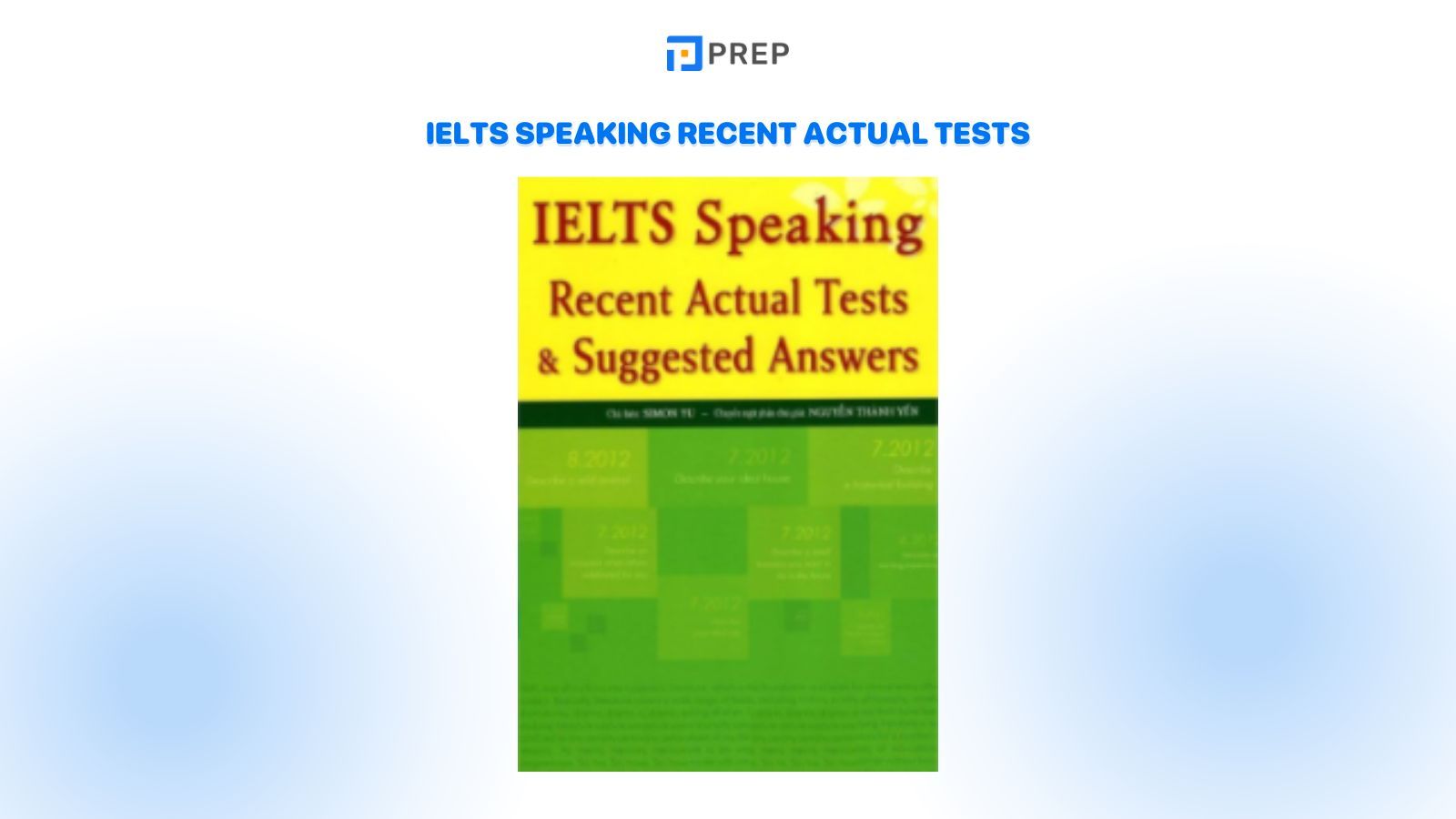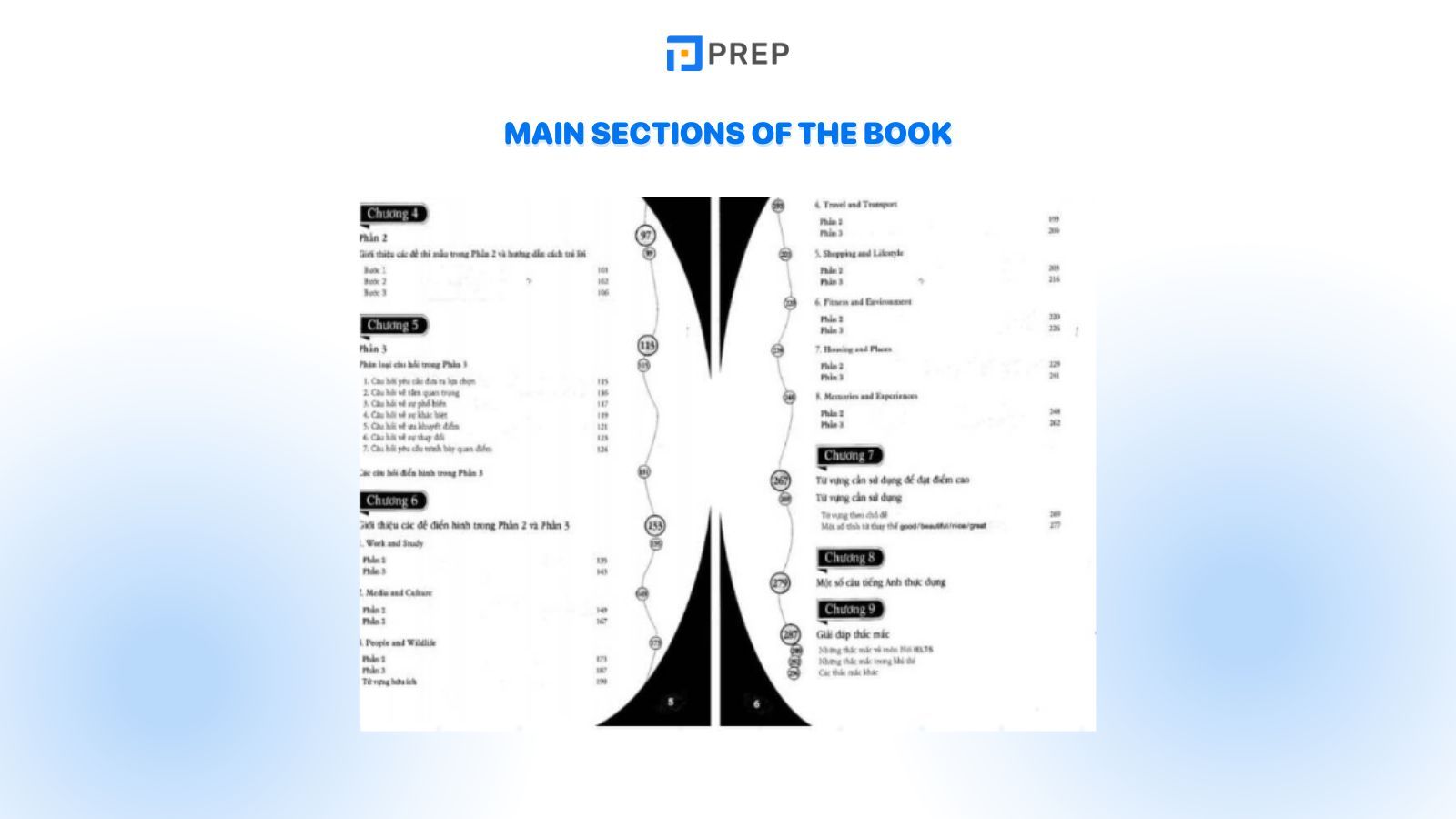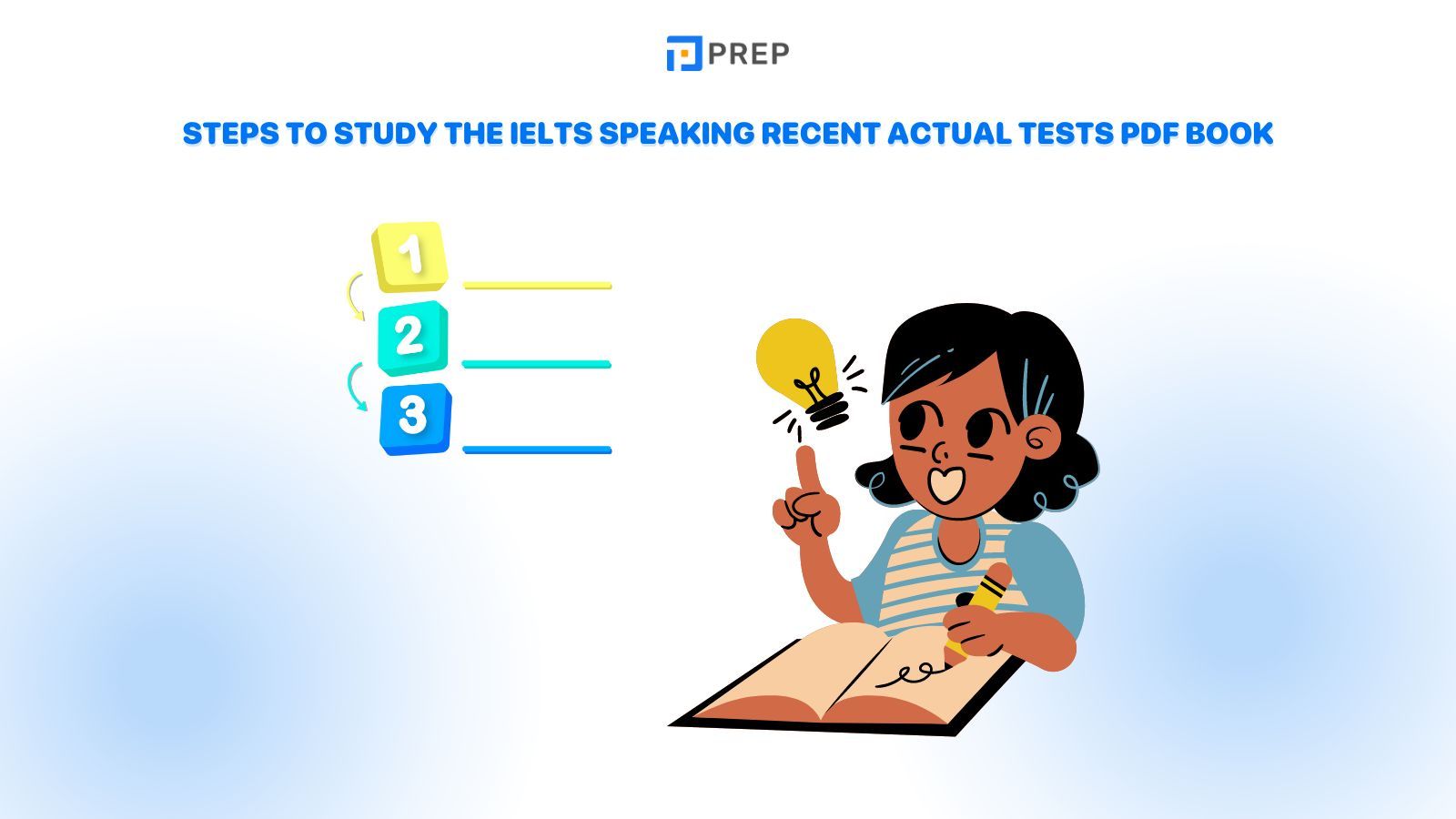The IELTS Speaking Recent Actual Tests book - a treasure trove of ideas for Speaking
The final book in the IELTS Actual Test series is the IELTS Speaking Recent Actual Tests book. If you are looking for IELTS Speaking material to achieve a band score of 6.5+, then the IELTS Speaking Recent Actual Tests book is the right choice. Let's explore what this book has to offer!
- I. Overview of IELTS Speaking Recent Actual Tests book
- II. Advantages and disadvantages of the IELTS Speaking Recent Actual Tests book
- III. Steps to study the IELTS Speaking Recent Actual Tests book
- 1. Step 1: Understand the fundamental knowledge in the IELTS Speaking test
- 2. Step 2: Study the scoring criteria in IELTS Speaking
- 3. Step 3: Typical topics and questions in IELTS Speaking
- 4. Step 4: Learn the Speaking process in Part 2 & refer to sample topics
- 5. Step 5: Classify the questions in Speaking Part 3
- 6. Step 6: Practice speaking regularly every day
- IV. Where to buy the IELTS Speaking Recent Actual Tests book?

I. Overview of IELTS Speaking Recent Actual Tests book
1. General introduction
The IELTS Speaking Recent Actual Tests book is a learning resource for those who want to prepare for the IELTS Speaking test. The book contains a collection of recent real test papers, helping readers become familiar with real test questions and develop skills for the speaking test.

The book includes IELTS Speaking test papers ranging from easy to difficult, gradually improving English speaking abilities. Each exercise in the book comes with questions and prompts similar to those in the actual IELTS test. This helps readers become familiar with question patterns, build answers, and practice vocabulary and grammar related to various topics.
Additionally, the book provides helpful suggestions and tips for readers to improve their English speaking skills, such as organizing ideas, using flexible and natural language, enhancing listening skills, and responding to examiners.
|
2. Main sections of the book
The IELTS Speaking Recent Actual Tests book consists of 9 chapters, each corresponding to different knowledge areas. Let's find out what knowledge areas you will learn from the IELTS Speaking Recent Actual Tests book!

|
Chapter Name |
Content |
|
Chapter 1 |
|
|
Chapter 2 |
|
|
Chapter 3 |
|
|
Chapter 4 |
|
|
Chapter 5 |
|
|
Chapter 6 |
|
|
Chapter 7 |
|
|
Chapter 8 |
|
|
Chapter 9 |
|
3. Suitable target audience for the book
The IELTS Speaking Recent Actual Tests book is mostly used by two main target groups:
- Students: Students who are preparing for the IELTS Speaking test can use this book to familiarize themselves with real test questions and practice their English speaking skills. Practicing with the exercises and questions in the IELTS Speaking Recent Actual Tests book helps students become familiar with the structure and requirements of the IELTS speaking test.
- Teachers: The IELTS Speaking Recent Actual Tests book provides teachers with a compilation of common topics in IELTS Speaking. From this, teachers can extract knowledge from the book to create Speaking test sets with different and diverse questions for students to practice.
II. Advantages and disadvantages of the IELTS Speaking Recent Actual Tests book
So, what are the advantages and disadvantages of the IELTS Speaking Recent Actual Tests book? Let's explore the pros and cons so that you can maximize the benefits and address any shortcomings in the IELTS Speaking Recent Actual Tests book!
1. Advantages
- Updated material: The IELTS Speaking Recent Actual Tests book provides recent test papers in the format of the current IELTS Speaking test, helping you become familiar with the structure, questions, and requirements of the current test.
- Diverse topics: The IELTS Speaking Recent Actual Tests book covers various topics, from social issues, culture, and the environment to technology, travel, and education. This helps you improve your vocabulary and general knowledge and grasp question types that may be asked in these topics.
- Detailed explanations: Each question from Part 1 - Part 2 - Part 3 is thoroughly explained, providing answer tips, idea development, and suggested prompts to help you understand how to respond and achieve corresponding scores.
- Simulates real test parts: The IELTS Speaking Recent Actual Tests book provides exercises and questions that simulate those in the actual test, helping you practice speaking skills and build confidence in preparing for the IELTS Speaking test.
2. Disadvantages
- Limited coverage of skills and knowledge: Since the IELTS Speaking Recent Actual Tests book focuses only on the IELTS Speaking test, you need to use other materials to practice for the remaining parts of the IELTS test, such as Writing, Listening, and Reading.
- Lack of detailed guidance: The IELTS Speaking Recent Actual Tests book primarily focuses on providing exercises and questions, but does not delve into the principles, rules, and scoring criteria of the test. This may make it difficult for you to understand or lack the necessary knowledge to achieve high scores.
- Inconsistent difficulty level: The exercises in the IELTS Speaking Recent Actual Tests book may have inconsistent difficulty levels, ranging from easy to difficult, which may not accurately reflect the actual test.
- Lack of reflection and personal interaction: This is one of the major drawbacks when studying speaking skills from a book. In the actual test, you will have to converse and interact with the examiner, but when studying with the IELTS Speaking Recent Actual Tests book, you cannot practice the natural flow of conversation. Therefore, it is recommended to find a partner to practice IELTS Speaking for more effective preparation!
III. Steps to study the IELTS Speaking Recent Actual Tests book
So how can you improve your speaking skills with the IELTS Speaking Recent Actual Tests book? Let's explore the following study steps together!
1. Step 1: Understand the fundamental knowledge in the IELTS Speaking test
Before we can speak in complete sentences, words, and even longer conversations, we need to build a strong foundation of knowledge. This includes vocabulary, sentence patterns, basic grammar, and more. In Chapter 1 and Chapter 2 of the IELTS Speaking Recent Actual Tests book, you will be guided on important knowledge such as:

- Using adverbs at the beginning of sentences.
- Basic sentence patterns.
- Useful phrases.
- Common adjectives ending in -y.
2. Step 2: Study the scoring criteria in IELTS Speaking
Before you start practicing IELTS Speaking, it's important to understand the four basic scoring criteria for the IELTS Speaking test. This will help you plan and prepare your study materials effectively. The criteria are as follows:
|
Criteria |
Detail |
|
Fluency and Coherence |
This criterion assesses your ability to speak English fluently and naturally. You need to demonstrate the ability to express opinions coherently, organize ideas and information logically and coherently. |
|
Pronunciation |
This criterion assesses your pronunciation skills in English. You need to pronounce individual words and the context of the story clearly and comprehensively. Accurate pronunciation ensures effective communication of ideas. |
|
Vocabulary |
This criterion assesses your ability to use a wide range of vocabulary accurately in your speaking. You need to use appropriate vocabulary, avoid excessive repetition, and demonstrate flexibility in using language. |
|
Grammatical Range & Accuracy |
This criterion assesses your ability to use English grammar accurately and flexibly. You need to understand and apply grammar rules correctly, avoid basic grammatical errors, and use complex grammatical structures accurately. |
3. Step 3: Typical topics and questions in IELTS Speaking
In IELTS Speaking, most questions revolve around common topics, and examiners often change the wording of the questions. So, what are the typical topics and questions that frequently appear in the IELTS Speaking test?
For example, based on page 48, Part 1, Chapter 3 in the IELTS Speaking Recent Actual Tests book, we can see some typical question types and topics that often appear in Part 1, such as:
|
Part |
Topic |
Question |
|
Part 1 |
Your work and Study |
|
|
Your hometown |
|
|
|
Your hobbies and interests |
|
And there are many other common topics that you can explore in the IELTS Speaking Recent Actual Tests book!
4. Step 4: Learn the Speaking process in Part 2 & refer to sample topics
After familiarizing yourself with the topics in Part 1, you can move on to Part 2. In Chapter 4, we can learn about the steps to conquer IELTS Speaking Part 2:
- Step 1: You will receive a cue card from the examiner.
- Step 2: After hearing the prompt, such as "Now you can start talking for one or two minutes" or similar phrases, you can begin your speaking. Remember, the maximum time allowed is 2 minutes!
- Step 3: After completing your answer, the examiner will move on to Part 3, which could be related to the same topic or different questions in Part 3.
5. Step 5: Classify the questions in Speaking Part 3
The final part of the IELTS Speaking test is often the most challenging. This part not only requires a diverse and rich vocabulary but also demands open-ended knowledge. So, what types of questions can you expect in Part 3? Let's explore in Chapter 5!
|
Question types |
Sample answers |
|
Questions requiring choices |
Which one is the most important, your relatives and neighbors? |
|
Questions about importance |
Is protecting animals important? |
|
Questions about popularity |
What is the most popular way of relaxing for Vietnamese people? |
|
Questions about differences |
What is the difference between men and women when considering relaxation? |
|
Questions about advantages and disadvantages |
What are the advantages and disadvantages of raising a pet? |
|
Questions about changes |
How has the way of traveling changed recently in your country? |
|
Questions that require expressing opinions |
What kinds of films do children like to watch? |
6. Step 6: Practice speaking regularly every day
To improve any skill, regular practice is essential. Practicing speaking daily will help you enhance your speaking skills quickly. Here are some ways you can practice speaking:
- Familiarize yourself with the topics: Before practicing speaking, become well-versed in the common topics that appear in the IELTS Speaking test, including family, work, education, travel, and society. Then, learn vocabulary and sentence structures related to these topics so that you don't spend too much time thinking about vocabulary while speaking.
- Practice listening and pronunciation: Listen to English materials such as programs, podcasts, or English movies to improve your listening and pronunciation skills. Watching English shows combined with shadowing techniques can help you improve your speaking style and make your accent sound more natural and native-like. Additionally, you can learn from how they express ideas and opinions naturally:
-
- English podcast: VOA Learning English, Elementary Podcasts, ESL Pod, BBC The English We Speak, All Ears English,...
- English game show: Little Big Shot, The Ellen Show, The Tonight Late Show With Jimmy Fallon, MasterChef (America), Survivor,...
-
- Practice speaking on your own: If you can't find a practice partner, you can still practice speaking by yourself. Use your phone or a voice recorder to record your speaking. Then, listen to it and self-evaluate your recording. Pay attention to grammar, vocabulary, and pronunciation errors. Work on improving those aspects in your subsequent speaking attempts.
IV. Where to buy the IELTS Speaking Recent Actual Tests book?
To study effectively, you can purchase the physical book from e-commerce websites like Tiki, Shopee, or reputable bookstores like Fahasa, Vinabook, and other bookshops.
PREP suggests checking out the provided links for purchasing or downloading the PDF version of this valuable resource.
Not Available
PREP hopes that the book review has helped you understand more about the content and structure of the IELTS Speaking Recent Actual Tests book. With this comprehensive resource at your disposal, you can confidently prepare for the IELTS Speaking test and increase your chances of success. Whether you are a beginner or an advanced learner, this book offers valuable practice materials to enhance your speaking skills. So if you are looking for IELTS Speaking preparation materials, this book is indeed very suitable. Wishing you success in your IELTS Speaking practice!

Hi I'm Chloe, and I am currently serving as an Product Content Administrator at Prep Education. With over five years of experience in independent online IELTS study and exam preparation, I am confident in my ability to support learners in achieving their highest possible scores.
Comment
Premium content
View allPersonalized roadmap
Most read












